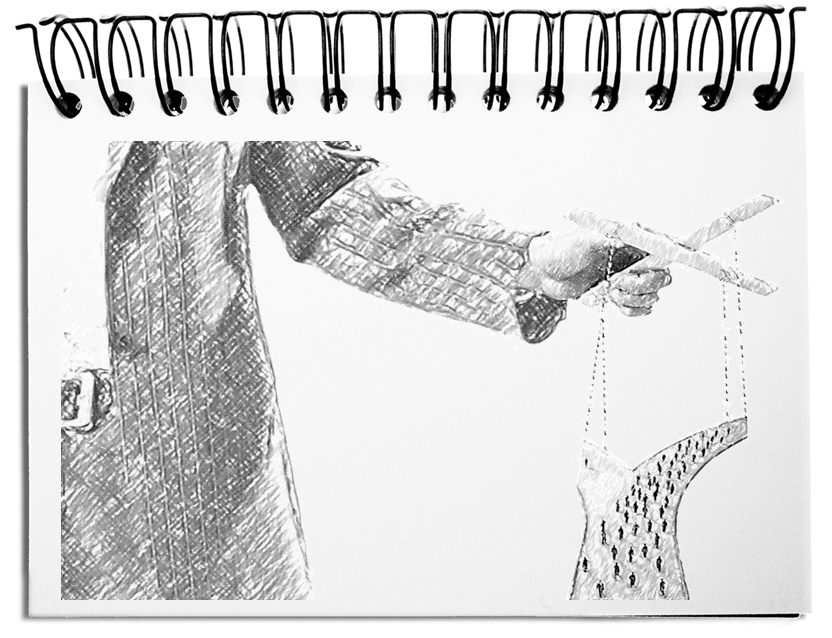Not all superiors want to take responsibility but rather earn more. In the absence of expert development paths, they have no choice but to assume a position that replaces their expert with leadership requirements: above all, leading and promoting themselves and others; building and maintaining relationships; developing images of the future and making decisions; solving problems; accepting results. Since leaders are multipliers, their convictions spread through their sphere of influence, e.g.
- Their conception of people: humans are unwilling (Theory X), or humans are motivated (Theory Y)
- Their worldview: the world is a machine or an organism
- Their leadership understanding: top-down versus bottom-up versus inside-out
- Their contribution: determine direction versus generate momentum versus letting go
Leadership is often reduced to the CHARISMATIC UNIVERSAL GENIUS, whose abilities are innate. In this context, a look at the book Managing, Performing, Living by Fredmund Malik is recommended. He shifts the focus to the leader’s effectiveness through rules and principles and a set of tasks, tools, and communication.
In this blog post, you discover four roles you, as a careful observer, find in companies.
- Principals
The days of Louis XIV are over. Nevertheless, authoritarian leadership styles that rule from top to bottom still exist. Guidelines are dictated. Politically correct, they no longer act as authoritarian despots but as purchasers. They expect duty fulfillment without opposition or resistance. The absolutistic rulers of the past had little data available for decision-making. Now, a flood of insights is open to all parties. As a result, today’s potentates run the risk of turning out to be micromanagers who interfere in the details of execution.
The focus is on order. This role is influential with precise specifications of the content, timeframe, and available budget. Those who manage to suppress their autocratic behavior can achieve a lot. - Administrators
The times of carefully erected corporations are coming to an end. Even if the size is still the goal, decision-makers are now learning that they need new delegation approaches. Ashby’s Law of Requisite Variety has taught us that the diversity of answers must be greater than those of the questions raised. The ordinarily rigid organization of structures and processes gets replaced by dynamic units of about 150 participants who act to a large extent autonomously in the interest of the whole. The typical administration obstructs this flexibility since its regulations have no chance to justify all possible cases.
The roles, the TARs (task, authorities and responsibilities) are at the center. The aptitude in defining roles ensures the balance between commonality and freedom. Memorable governance creates the overarching mindset. The appropriate degree of specifications and the generous evaluation of the fulfillment are crucial. - Salespeople
The days of all-around geniuses, who master all aspects of their company, are over. In the absence of expertise, impressive companies exploit their creative sources – e.g., when 3M allocates 10% of its working time to the creative will of everybody, or when Google gives its employees the freedom to generate new offerings ever through cross-functional collaboration, a refreshing management style and a focus on results.
This is primarily about solutions that need the chance to prove themselves in the marketplace. For this to happen, extended leeway must be created above all, which provides ample means to turn ideas into results. In this environment, tolerance and openness, on the one hand, and clever marketing are necessary to convert the existing possibilities into advantages. - Servants
The days of the top-down chain of command have passed with the general availability of data. Knowledge is power has lost its meaning as groups ALWAYS know more than individuals. Accordingly, the hierarchy has been turned upside down. Leadership levels now serve their assigned units (i.e., Servant Leadership). To get the right thing done right at the point of action, individuals need broad authority and, when difficulties arise, support from their leaders.
The focus lies on the impact of offerings – e.g., noticeable quality, friendliness at the Point of Sale, and customer satisfaction. To do this, employees must be capable of acting – i.e., to have sufficient resources, expertise, and support. For this role, the leaders should have empathy, understanding, and presence.
Bottom line: Traditional leadership approaches, i.e., autocratic, top-down reign, excessive bureaucracy, or technocratic silo organizations no longer fit the fast-paced VUKA world. How the roles of the future will look is up to your imagination. The functions described are distributed along the axes of decision-making direction (top-down vs. bottom-up) and communication style (one-way vs. either way). They are intended to make today’s leaders consider their role and provide impulses to rethink their working style. In the end, everyone decides whether they want to lead in this or in a different way.

